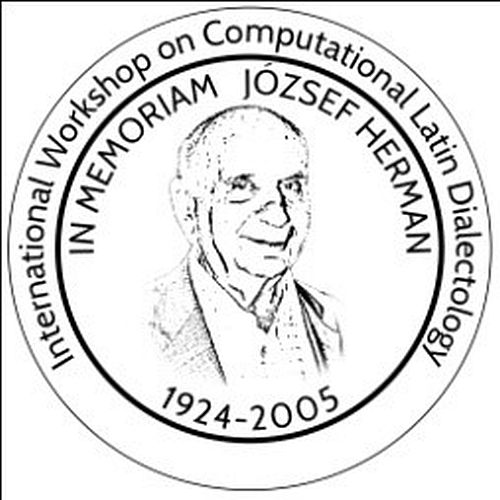Seventh International Workshop on Computational Latin Dialectology
Program
Thursday, 13 June 2024

9:00 – 9:15
Opening – In memoriam József Herman (1924-2005):
Cser, András (Director, IHLUS[1], HUN-REN NYTK, Budapest), Bakró-Nagy, Marianne (IHLUS, HUN-REN NYTK, Budapest) and Kiss, Sándor (Eötvös Loránd University Budapest – University of Debrecen)
SESSION 1
Chair: Kiss, Sándor (Eötvös Loránd University Budapest – University of Debrecen)
9:15 – 9:50
Adamik, Béla (RGLHLD[2], HUN-REN NYTK, Budapest) – History of the Latin sound system of Etruria (Tuscany) from Augustus to Charlemagne
9:50 – 10:25
Barchi, Serena (University of Tuscia) – Crossroads of Cultures: Gothic, Greek, and Vulgar Latin in the Ravenna Papyri
10:25 – 11:00
Szlovicsák, Béla (RGLHLD, HUN-REN NYTK – Eötvös Loránd University, Budapest) – Grammatical Gender in the Charters of St. Gallen
11:00 – 11:30 Coffee break
SESSION 2
Chair: Paolo Greco (University of Naples Federico II)
11:30 – 12:05
Tamponi, Lucia (RGLHLD, HUN-REN NYTK – University of Pisa) – From quill to query: Linguistic features and challenges of 8th-century Latin charters from Tuscany
12:05 – 12:40
Dániel Seres (Semmelweis University Budapest) – Changes in linguistic awareness according to the use of H as evidenced by the inscriptions of the city of Rome during the imperial period
12:40 – 13:15
D’Argenio, Elisa (RGLHLD, HUN-REN NYTK, Budapest) – Direct speech in medieval legal charters: a study of the notitiae iudicati from Lucca (8th century)
13:30 – 15:00 Lunch break
SESSION 3
Chair: Sornicola, Rosanna (Academia Europaea)
15:00 – 15:35
Nemes, Szilvia (RGLHLD, HUN-REN NYTK – Eötvös Loránd University Budapest) – In ea vero ratione. Legal Latin Language of the Precaria Documents of St. Gallen
15:35 – 16:10
Urbanová, Daniela (Masaryk University Brno) – The legal vocabulary and aims of Latin curse writers.
16:10 – 16:45
Barta, Andrea (RGLHLD, HUN-REN NYTK, Budapest) – Vitaline: lawyer or matron? A new curse text from Aquincum
Friday, 14 June 2024
SESSION 1
Chair: Szabó, Ádám (Hungarian National Museum – University of Public Service Budapest)
9:00 – 9:35
Tantimonaco, Silvia (University of Oviedo) – Panna. The status quaestionis of a vox epigraphica
9:35 – 10:10
Vágási, Tünde (Semmelweis University Budapest) – Vulgar Latin names and epithets of deities in Pannonia
10:10 – 10:45
Gaspar, Catarina (University of Lisbon) – Mascellius / Mascellus, Bouius / Bouus and other: an analysis of some specific uses of nomina and cognomina in the Roman inscriptions of the ancient Lusitania
10:45 – 11:15 Coffee break
SESSION 2
Chair: Cuzzolin, Pierluigi (Academia Europaea)
11:15 – 11:50
Cotugno, Francesca (University of Verona) – The ars traducendi of Hilduin’s of St. Denis
11:50 – 12:25
Pálfi, Dorottya (RGLHLD, HUN-REN NYTK – Eötvös Loránd University Budapest) – Additional aspects to the examination of the charters’ demonstrative usage (ChLA I, II, CXVIII)
12:25 – 13:00
Papini, Alessandro (RGLHLD, HUN-REN NYTK – Ghent University) – Epigraphy and (historical) sociolinguistics. Some methodological remarks on the use of (Latin) inscriptions for the study of “vertical” variation
13:00 – 13:10
Closing remarks – Bakró-Nagy, Marianne (IHLUS, HUN-REN NYTK, Budapest) and Adamik, Béla (RGLHLD, HUN-REN NYTK, Budapest)
Please find the abstracts of the papers here.
* * *
The Workshop is organized in the framework of the HORIZON-ERC-2022-ADG project no. 101098102 entitled Digital Latin Dialectology (DiLaDi): Tracing Linguistic Variation in the Light of Ancient and Early Medieval Sources and (https://cordis.europa.eu/project/id/101098102) and of the NKFIH (National Research, Development and Innovation Office) project no. K 135359 entitled Computerized Historical Linguistic Database of Latin Inscriptions of the Imperial Age (see: http://lldb.elte.hu/) to be realized with the collaboration of the Research Group for Latin Historical Linguistics and Dialectology of the HUN-REN Research Centre for Linguistics and of the Latin Department of the ELTE Eötvös Loránd University, Budapest.
[1] IHLUS = Institute of Historical Linguistics and Uralic Studies
[2] RGLHLD = Research Group for Latin Historical Linguistics and Dialectology